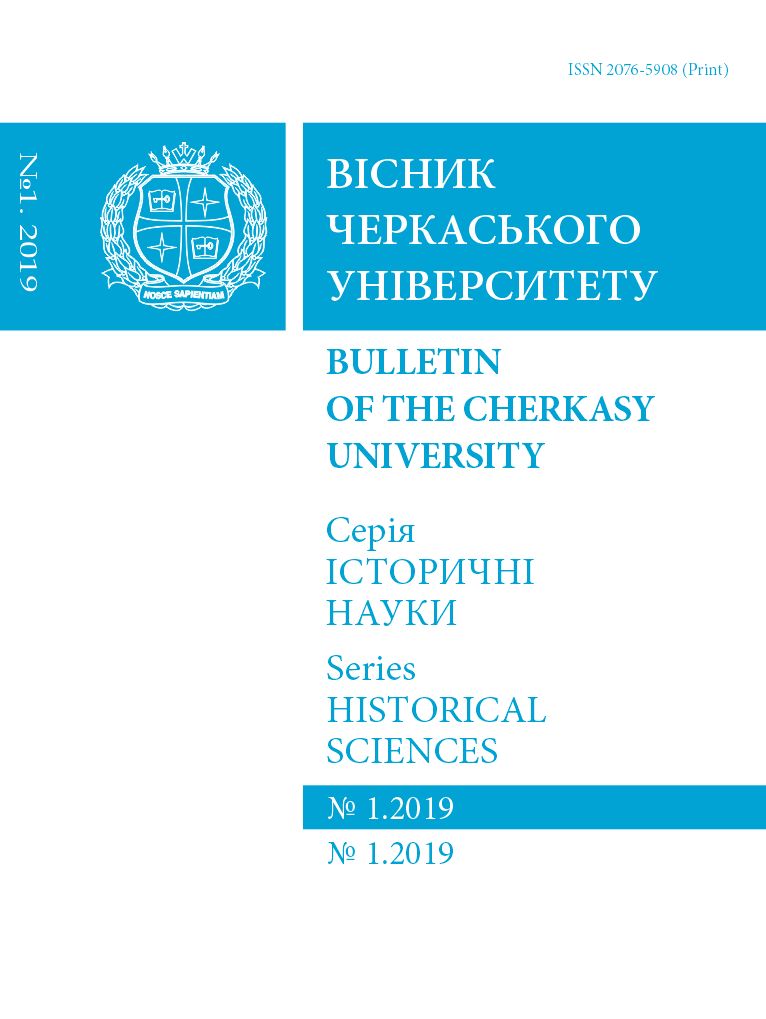Theories of generations as a research space in modern Ukrainian historiography of peasantry
Main Article Content
Abstract
Abstract. Introduction. A historian is constantly in the process of improving the theoretical and methodological foundations of research. This is prompted by the very nature of professional activity, as the historian’s dialogue with the past is continuously refined. The productivity of the epistemological tools used depends both on the ability to apply an updated scientific worldview (which permanently emphasizes an interdisciplinary approach) and on the improvement of one’s own historiographical style (in the words of D. Beauvois, «one’s own path»). However, this style contains pitfalls, such as the fact that the results of years of effort are not immediately visible – they «manifest later». By proposing the theory of generations for interpreting the history of peasantry in the modern era, the author aims to construct (optimize) its principles based on Ukrainian historical experience. Purpose of the article. The aim of the article is to initiate the study of Ukrainian peasantry (the peasant world) through the lens of the advantages of the theory of generations. Results. After analyzing the available literature, the author concluded that, in terms of its potential characteristics, the theory of generations is entirely «historical». This is because the natural («universal») process of generational change occurs according to a defined chronological sequence, which objectively reflects the course of history as such. In traditional society, marked by «patriarchalism and conservatism» this connection is particularly strong (which is precisely why it attracts our attention). The work of American scholars William Strauss and Neil Howe did not serve as a universal and widely accepted model for interpreting events, phenomena, and processes from a historical perspective. These likely deterred historians from using it. However, the situation appears much more attractive when it comes to studying peasants – these «silent» people of pre-national society who, in the 20th century, finally «spoke» with their own voice. Thus, without disrupting the tradition of borrowing another Western theoretical trend and the historiography developed on its basis, we propose to uncover its potential on a qualitatively different historical foundation. Originality. Evidently, this «learning» did not imply radical (revolutionary) changes, nor does it require the use of stereotypical assessments that often mar texts. What is more interesting are certain parallels, such as the phenomenon of identifying a generation as «silent». In the Ukrainian case, participation in the revolution, civil war, collectivization, and previously impossible internal migration (spurred by dictatorially inspired social mobility) was not so much a struggle for socialism-communism («city-garden») as it was a continuous fight for survival. Rural people born in the 1920s to the first half of the 1940s were shaped by hunger (malnutrition), blackmail, repression (the horrors of totalitarian regimes), and biased, extremely aggressive propaganda. Here, we see that the experiences of urbanized and traditional societies were very similar. The founders of the theory would describe urban «silents» as patient and law-abiding, but for peasants, we need to make a correction – not so much law-abiding as fearful, cautious, and publicly compliant with authority. Nonetheless, differences did exist, which is what attracts us to the theory of generations. For example, it is difficult to even imagine a phenomenon such as, hypothetically, «rural sixtiers». Conclusion. In the article, the author touches upon only certain characteristics of one generation – the «silent» ones: people who are patient, obedient, reserved, and not very talkative. However, the proposed universalism is relative: «silent» implied much more, such as «hardworking» («lazy»), «peaceful» («quarrelsome»), and also «drinking», «mobile», «spiritual» and so on.
Article Details
References
References
The «Awkward Class» in Modernization Projects. (2010). Ukraine Modern, 6. Boundless Village, 9–44. Kyiv: Krytyka [in Ukrainian].
Zashkilnyak, L. (2007). Intellectual History as a Research Space in Contemporary Ukrainian Historiography. Proceedings of the III International Scientific Congress of Ukrainian Historians «Ukrainian Historical Science on the Path of Creative Progress», 1, 104–108. Lutsk: Vezha [in Ukrainian].
Hrymych, М. (ed.). (2021). Folk Culture of Ukrainians: Human Lifecycle. In 5 volumes. Vol. 4: Maturity. Men. Male Subculture. Kyiv: Duliby [in Ukrainian].
Theory of Generations: Why We Are Different and How to Understand Each Other. Retrieved from: https://d-grand.com/inforaciiny-portal/teoriia-pokolin-chomu-mi-rizni-ta-iak-porozumitisia-odne-z-odnim [in Ukrainian].
Hrytsak, Y. (2013). Historians and Time. Retrieved from: https://ucu.edu.ua/news/yaroslav-hrytsak-istoryky-i-chas [in Ukrainian].
Dvorkin, I. New Local History in Teaching the History of Ukraine in Technical Universities. Retrieved from: https://www.kpi.kharkov.ua/archive/microcad/2016/S19/s20.pdf [in Ukrainian].
Yakovenko, N. (2007). Introduction to History. Kyiv [in Ukrainian].
Strauss, W. Howe, N. (1991). Generations: The History of America’s Future, 1584–2069. New York: William Morrow.
Prysiazhniuk, Yu. (2022). Ukrainians: Generation of Contemporary Youth. Cherkasy Region. 40, 3 [in Ukrainian].
Kashchavtseva, K. Theory of Generations: what is its essence, main principles, and how to find common ground with people knowing about it. Retrieved from: https://www.unian.ua/society [in Ukrainian].
Sufferers on their land. Memoirs of Lida Prysiazhniuk from Different Years. (2013). Cherkasy: Vertical [in Ukrainian].
Stets, N. Briefly about the theory of generations. Retrieved from: https://iqholding.com.ua/articles/korotko-pro-teoriyu-pokolin [in Ukrainian].
Zabuzhko, O. (2010). «On what basis does the group u with a bubble decide the fate of the nation?» Literary Ukraine, July 22, 12 [in Ukrainian].
Zaiarniuk, A. «Peasantry» as a category of socio-historical analysis (on the example of Eastern Galicia in the 19th Century). (2006–2007). In: Krykun, М. (ed.). Confraternitas. Jubilee collection in honor of Ya. Isaievych. Lviv, (Ukraine: cultural heritage, national consciousness, statehood: collection of scientific works, 15), 543–553 [in Ukrainian].

